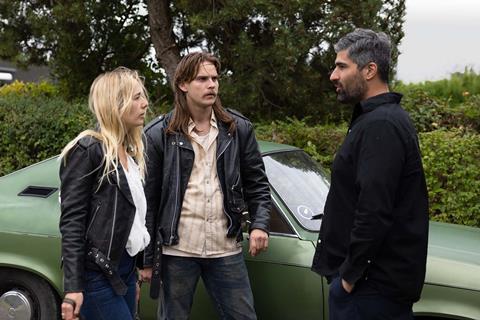The Danish production sector has been almost shut down for a year amid talks with the streamers for improved terms. Short-term deals have now been reached that could have international repercussions.

At the end of November, Viaplay announced Bullshit, a new six-part Danish drama set against the biker-gang war of 1980s Copenhagen. It was a much-needed sign of hope for the local industry. This was the first Danish project to be greenlit by a streamer this year.
The storm started brewing in May 2021 when Create Denmark, which represents a number of creative workers’ unions, and the Danish Producers Association, told Danish producers not to negotiate their own one-off deals with the streamers and instead use a countrywide framework to seek more advantageous rights payments for writers, directors and actors.
In December 2021, the unions and producers tried to negotiate an overall deal with the three streamers working in Denmark at the time, local TV2 and international services Netflix and Viaplay.
What the creatives were looking for is very familiar: more share in the back-end if a show was a hit, not just a lump sum at greenlighting. But the streamers flatly refused the proposed terms and most of 2022 was spent trying to negotiate individual deals with each streamer. TV2 and Viaplay signed interim deals this summer, and Netflix announced its agreement on November 28. Netflix’s deal, with specific terms confidential as of early December, has now been ratified by Create Denmark and the Producers Association, and it “includes a guaranteed initial rights payment upon launch on the Netflix service, followed by additional remuneration based on the success of a show”.
Bullshit actually shot this summer as it had been developed before the negotiations with Create Denmark started and was ready to go as soon as terms were agreed. It was a rare case, as the show’s producer Malene Blenkov of Nordisk Film Creative Alliance, says: “Even if things open up again, our development has slowed down drastically and I can only imagine how projects will be queueing up for development and production.”
Most of this year has been a “perfect storm” of problems for Danish producers, says film and TV producer Meta Louise Foldager Sorensen, renowned for Melancholia and Borgen. The situation is complicated further by the proposed 6% levy for streamers’ turnover in Denmark, the lack of a Danish filming incentive and a strong local currency that makes it especially expensive to shoot in the country. All of this while coming out of a pandemic.
Her companies SAM Productions (backed by Studiocanal) and Meta Film had already started developing more projects in Sweden and Norway, and have recently ramped up those operations — even moving Danish projects abroad — while Denmark has effectively been shut down.
“My company was doing four to seven shows a year and now I’m doing one,” she says, pointing to The Orchestra, backed by public broadcaster DR. It has been a “stressful and sad time,” she adds, noting it is not just production that has been paused, it’s also been development, which means repercussions could last for years.
Although the deal negotiations were confidential, TV2 has said Create Denmark’s proposed terms asked for 600% more rights payments than they used to get under former deals (Create Denmark disputes that figure but did not respond to Screen International’s request for an interview).
Foldager Sorensen adds: “The assumption the global players needed to buy Danish content was wrong…To put a gun to someone’s head is not going to work. We haven’t seen the consequences yet of all this.”
Jorgen Ramskov, CEO of the Danish Producers Association, which represents 150 companies across TV, feature films, documentaries, commercials and gaming, notes negotiations behind the scenes had been going on for many years and came to a head with the December 2021 proposal. “It’s been a tough time and we’ve learned a lot,” he says.
Ramskov admits going in with “a one-size-fits-all model was a bad decision in hindsight.” For instance, TV2 is only reaching a Danish audience while Netflix is global — and Viaplay is between the two, a Nordic company working in several international markets.
Some industry experts suggest the Danes got greedy with their initial proposal — Ramskov does not use that word but says “the value of Danish content was overrated, that’s a simple fact. The services could still run without Danish content and that was a clear wake-up call.”
The three deals now in place “are a framework,” says Ramskov, who adds “there are special issues that can be negotiated on each production… but the main ambition was to have this framework to say this is the way we calculate payments.”
Netflix is said to have agreed to similar models in Germany, Norway and Sweden.
Levy uncertainty
A few clouds remain: all three of the current streamer deals will need to be renegotiated and extended to establish more long-term pacts; Disney+ and Amazon will be the next two streamers to be approached for bespoke deals.
Most worryingly, there is still uncertainty over a proposed levy on the streamers. In mid-2022, the Danish government proposed a 6% levy on all streamers’ turnover in Denmark. As Foldager Sorensen explains: “They never finished the lawmaking and nobody knows what it’s going to look like.”
The EU’s Audiovisual Media Services Directive, which came into effect in September 2020, lets member states decide what they ask of the streamers. As of September 2022, some EU member states had decided not to ask for a levy. Some had asked for modest levies — such as 1.5% in Greece, 2% in the Netherlands, 1.8%‑2.5% in Germany. The larger ones were 5% in Spain and 5.15% in France; Denmark (not yet in effect) was the highest proposed at 6%, according to research from the European Audiovisual Observatory. As of late November, Ireland is moving closer to finalising its levy plan.
While Viaplay was glad to get back into business in Denmark with the production of Bullshit, Viaplay chief content officer Filippa Wallestam warned about the levy troubles in her statement announcing the show: “To carry on greenlighting compelling productions like this we need regulatory certainty and a fair and balanced playing field in Denmark.”
Foldager Sorensen knows the Danish industry, from on-screen talent to every crew member, is ready to get back to work. “The market is developing so fast, it’s better to be working and producing good shows.”

























No comments yet